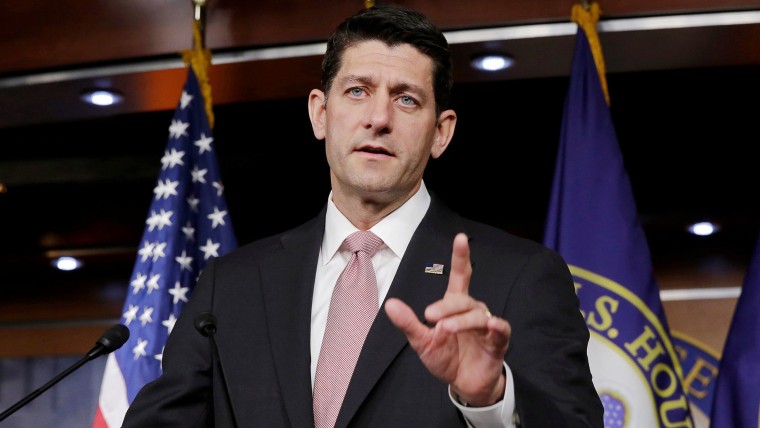The pattern is painfully familiar: there's a mass shooting; much of the public looks to policymakers to take new steps to protect Americans; the NRA's allies make excuses; and the news cycle moves on. Then there's another mass shooting, at which point the cycle begins anew.
And so, in the wake of the deadly high-school shooting in Parkland, Fla., this week, developments on Capitol Hill yesterday were rather predictable. House Speaker Paul Ryan (R-Wis.), however, said something a little different, and it's worth pausing to consider it in more detail.
Congress, Ryan said in a radio interview, needs to "take a breath and collect the facts." The Republican leader added, "We don't just knee-jerk before we even have all the facts and the data."
That's actually a sensible reaction. I'm aware of the political circumstances, of course, and I understand that when Ryan says he wants to "take a breath," it's possible the Speaker simply wants to buy some time and wait for the political world to lose interest, but let's not be cynical. Instead, let's take Ryan's comments at face value.
Why don't we "collect the facts" and pull together "the data"? Because a Republican policy won't let us. The Washington Post reported last fall:
[O]ne reason the positions are so intractable is that no one really knows what works to prevent gun deaths. Gun-control research in the United States essentially came to a standstill in 1996. After 21 years, the science is stale."In the area of what works to prevent shootings, we know almost nothing," Mark Rosenberg, who, in the mid-1990s, led the CDC's gun-violence research efforts, said shortly after the San Bernardino shooting in 2015.In 1996, the Republican-majority Congress threatened to strip funding from the Centers for Disease Control and Prevention unless it stopped funding research into firearm injuries and deaths. The National Rifle Association accused the CDC of promoting gun control. As a result, the CDC stopped funding gun-control research -- which had a chilling effect far beyond the agency, drying up money for almost all public health studies of the issue nationwide.
As regular readers may recall, it’s common knowledge that the NRA and its allies have fought to kill any kind of restrictions on firearm ownership. What’s less recognized is the fact that the gun lobby also helped block basic data collection, to the point that there’s “no current scientific consensus about guns and violence,” in large part because the NRA “has been able to neutralize empirical cases for control.”
Nearly 20 years after this policy took effect, the principal author of that policy, Arkansas Republican Jay Dickey, conceded that he has "regrets" over the policy that came to be known as the Dickey Amendment.
But the policy remains in place anyway. If Paul Ryan wants "facts" and "data," he's going to have to lift the ban on relevant research.
And who knows, maybe the House Speaker is sincere. Maybe Ryan really does want "facts" and "data," and his comments yesterday were an important signal about a major shift in the Republican Party's posture.
Heck, during congressional testimony yesterday, HHS Secretary Alex Azar "opened the door" to expanding federal gun violence research, suggesting possible room for progress.
So why not pursue this? Why shouldn't proponents of new gun-safety measure take Paul Ryan's rhetoric at face value and present him with a proposal to lift the Dickey Amendment, in order to provide policymakers with the research and data the House Speaker says he wants?
Sure, Ryan may not have been entirely sincere, but there's only one way to find out: offer to give the Speaker exactly what he's asked for.
